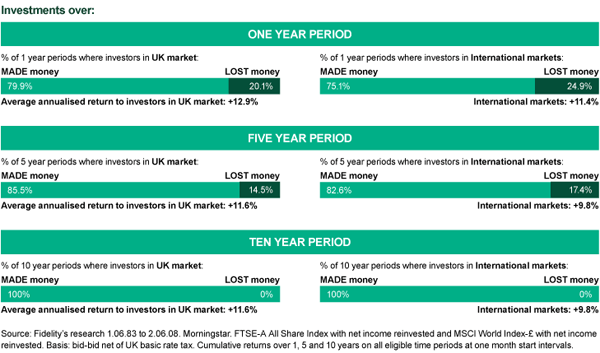 Albert Einstein famously said, “The most powerful force in the universe is compound interest.” Compound interest arises when interest is added to the principal, so that, from that moment on, the interest that has been added also earns interest.
Albert Einstein famously said, “The most powerful force in the universe is compound interest.” Compound interest arises when interest is added to the principal, so that, from that moment on, the interest that has been added also earns interest.
This addition of interest to the principal is called compounding. A bank account, for example, may have its interest compounded every year. In this case, an account with £1,000 initial principal and 20% interest per year would have a balance of £1200 at the end of the first year, £1,440 at the end of the second year, and so on.
You might think that your knowledge and skill will be the main determinant of how your investments perform. But never underestimate that most elemental force – the simple passage of time and its effect on compounded returns.
Put in its simplest terms, the phrase compound interest means that you begin to earn interest income on your interest income, resulting in your money growing at an ever-accelerating rate.
Three factors that determine your compound interest returns
There are three factors that will influence the rate at which your money compounds. These are:
- The interest rate you earn on your investment
- The length of time you can leave your money to compound
- The tax rate, and the timing of the tax, you have to pay to the government
This tells you that if you can achieve impressive annual returns over the long-term and use a tax-shelter such as an ISA or SIPP, you will end up with far more money.
The power of compounding over time
The best way to understand these concepts is to put them into a compound interest table that shows you just how substantially your wealth can be helped, or hindered, by small changes over time. Imagine you have an investor who sets aside a lump sum of £10,000. Take a look at the compound interest chart to see the influence of time and rate of return.

To ensure you are clear, a lump sum of £10,000 earning 4% per year for the next 50 years would grow into £71,067, if the purchases were made through a tax-free account such as an ISA or SIPP. However, that same £10,000 earning 12% per year for the next 50 years would grow into £2,890,022.
One glance at the compound interest chart and you may want to do whatever it takes to earn the higher rate of return - in this case, 16%. Remember that can be dangerous, as the higher the return you aim for, the higher the risk.
However risk can be reduced if you hold your investment for a long period of time, hence why equity linked investments should be held for a minimum of five years but preferably over 10 years.
Fidelity’s research shows that, historically, the longer an investor stays invested, the smaller the likelihood they will lose money and the greater the chance they will make money. This analysis covers a period of 25 years and looks at the difference in outcome to investors holding investments for ten years, compared to the results achieved by investors over five years and those staying invested for just one year.
Over a period of 25 years, containing 181 possible ten-year monthly start points, an investor taking a ten year view would never have made an overall loss on a UK or global portfolio. In contrast, investors taking a short term view would have run a much higher risk of their investment declining in value.
Please note that past performance is not a guide to what may happen in the future, and you should be aware that the value of an investment can go down as well as up. Changes in currency exchange rates will affect the value of any overseas investments.

As always, if you have any questions or thoughts on the points I've covered, please leave a comment below or connect with us @ISACO_ on Twitter.
Please note past performance should not be used as a guide to future performance, which is not guaranteed. Investing in Funds should be considered a long-term investment. The value of the investment can go down as well as up and there is no guarantee that you will get back the amount you originally invested.
Find out where an expert invests
Are you an ISA or SIPP investor with over £100,000 actively invested? Are you looking for better returns but are unsure which funds to invest in? ISACO Wealth, our personal investment service, allows you to buy the same funds as a star-performing investor. You find out where he invests, keep full control of your account, enjoy a close relationship with a trusted expert, and benefit from the potential for attractive long-term returns.
To find out where an expert invests >>













